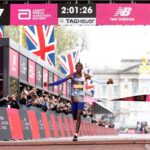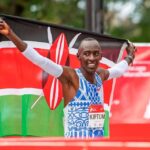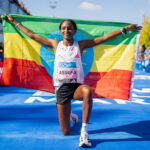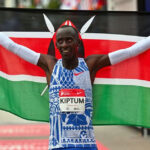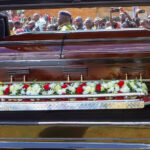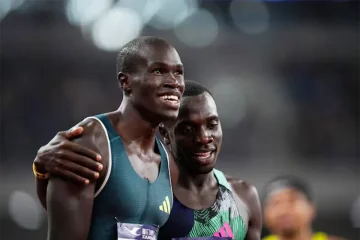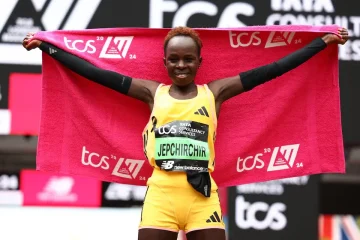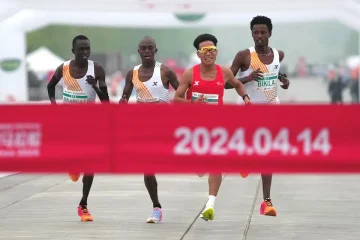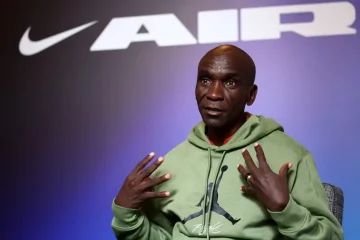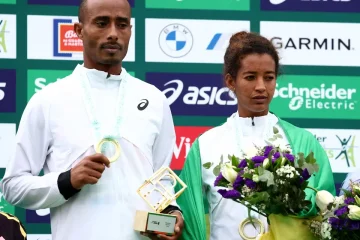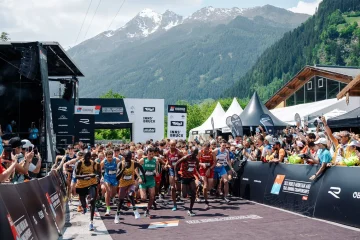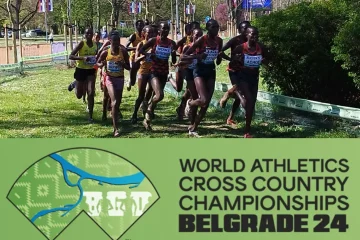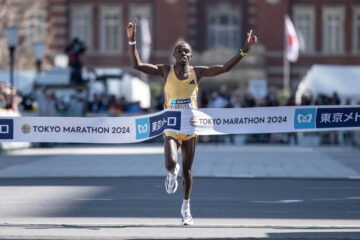AFRICA’S running reputation received another boost recently when 23-year-old Kevin Kiptum won the 45th edition of the Bank of America Chicago Marathon, setting a new world record for the regular marathon, of 02:00:35.
Kiptium’s time shaved 34 seconds off Eliud Kipchoge’s record of 2:01:09 set in Berlin in 2022. This is despite Kiptum making his international marathon debut just last December, in Valencia, where he clocked an astonishing 2:01:53.
While African running stars have for years dominated distance running, new and relatively younger stars are seemingly shattering records more easily, judging from their race splits and post-race assessments.
In his post-race statement to the press, Kiptum implied he clinched the victory with relative ease, stating, “I knew I was in good shape to run a fast race.”
Breaking away from the pack shortly before the 10K mark, he only had his pacers and fellow countryman Daniel Mateiko for company. While they reached the halfway point behind world-record pace, Kiptum’s reputation for a ferocious finish was upheld. His 19th mile was a blistering 4:21, leaving Mateiko behind as he surged to victory.
Kiptum’s triumph follows closely on the heels of Ethiopian marathoner Tigst Assefa’s remarkable women’s record of 2:11:53 at the 2023 BMW Berlin Marathon, a feat that left Brigid Koskei’s decade-old record of 2:14:04 in the dust.
But as Edwin Maritim, a Kenyan marathon athlete, explains, running a full marathon is a gruesome challenge that requires immense preparation and stability.
“Without physical and mental stability, it will be difficult for the body to respond positively throughout the course, let alone break a world record,” he remarks.
Another force behind the big improvements in distance running is cutting-edge running shoe technology complete with state-of-the-art features like ultra-thick responsive foams and carbon-fibre plates.
A 2017 Nike-funded study featuring 18 sub-elite runners who had run a 31-minute, 10,000-meter time found that super shoes could boost running by up to 4%.
As such, more recent brands, such as Adidas’ Adizero Adios Pro Evo1 and Nike’s Alphafly 3, among others, are reshaping the landscape of competitive running.
Assefa, for instance, wore Adidas’ recently launched Adizero Adios Pro Evo1, which, according to the Adidas website, was “designed specifically for race day.” Kiptum, on the other hand, donned Nike’s Der 163 trainers, Alphafly 3.
At 02:00:35, Kiptum now stands a mere less than 50 seconds shy of surpassing Kipchoge’s unofficial 2019 record of 1:59:40, achieved in Vienna, Austria, in a historic race against the clock.
While acknowledging the role of technology in these recent breakthroughs, British marathon coach Nick Bishop underscores that it isn’t the sole factor that is guaranteeing ongoing breakthroughs.
“It is technology doing what it was meant to do. ease things out, but it is not the main factor in these great performances,” he explained.
Bishop set out on a mission to Kenya in 2018, seeking to understand why Kenyans dominated marathon races and potentially learn the ‘tricks’. The former marathoner has established a community of athletes in Eldoret whom he coaches and supports.
“There is a lot of work being put in nurturing these stars… Some factors are natural, such as the high altitude, while others are purely the result of hard work and utmost dedication to the sport,” Bishop said, speaking to bird story agency from Eldoret.
For Bishop, a “can-do attitude” is deeply ingrained in Kenyan athletes from an early age. He also notes a sense of collective achievement among runners, evidenced by their collaborative training efforts.
“They train hard, running uphill in the wee hours of the day and late evening all week long except on Sunday. They are also religious,” he adds.
Bishop’s view coincides with that of Kiptum’s coach, Gervais Hakizimana, who, in an interview with the Associated Press, hinted at the immense hard work Kiptum puts in during training, racing upwards of 300km a week.
“He is very strong… He does all the training properly. He’s in his best years,” he disclosed.
In addition, there is a running legacy common to several East African nations that adds a strong motivational element to athletes from the region and provides inspiration and aspiration to new generations of talented runners.
Both government-funded and privately operated training camps also provide an environment free from distractions, allowing athletes to focus solely on their training.
Retired sports science lecturer David Kimugui, who oversees a private athlete training centre in Kenya’s Mount Elgon region points to the role played by running organisations in the region.
“Today, even in major cities, we have running clubs, mainly because of the sport’s successful past… Every time the elite athletes win, they silently inspire thousands of others,” he explains.
However, as Kimugui explains, there is an even greater opportunity for African countries to develop runners.
“Technological advancements will always grow; we just need to be ready to take advantage of them… We should be able to identify raw talent, especially from primary and secondary school levels, and nurture it,” he explained.

